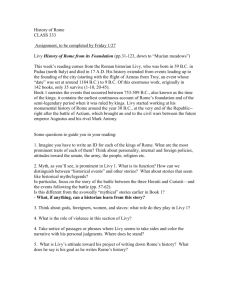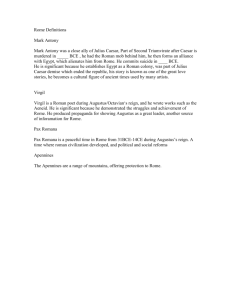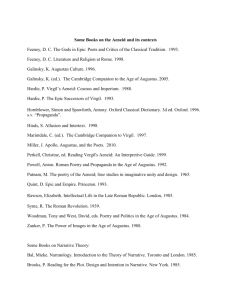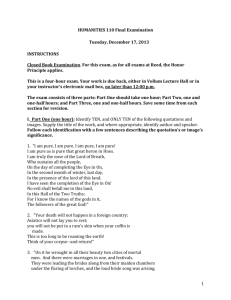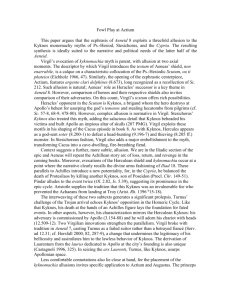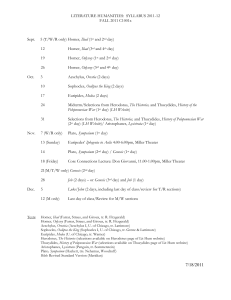Indebted. Obligation and Duty in Ancient Political
advertisement
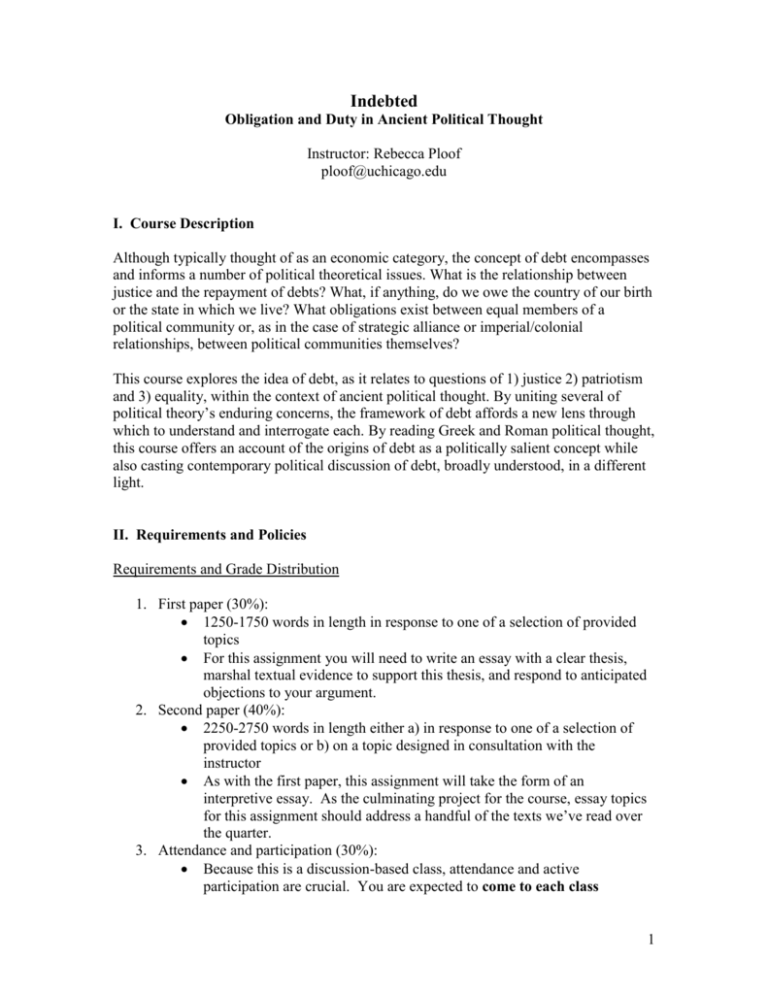
Indebted Obligation and Duty in Ancient Political Thought Instructor: Rebecca Ploof ploof@uchicago.edu I. Course Description Although typically thought of as an economic category, the concept of debt encompasses and informs a number of political theoretical issues. What is the relationship between justice and the repayment of debts? What, if anything, do we owe the country of our birth or the state in which we live? What obligations exist between equal members of a political community or, as in the case of strategic alliance or imperial/colonial relationships, between political communities themselves? This course explores the idea of debt, as it relates to questions of 1) justice 2) patriotism and 3) equality, within the context of ancient political thought. By uniting several of political theory’s enduring concerns, the framework of debt affords a new lens through which to understand and interrogate each. By reading Greek and Roman political thought, this course offers an account of the origins of debt as a politically salient concept while also casting contemporary political discussion of debt, broadly understood, in a different light. II. Requirements and Policies Requirements and Grade Distribution 1. First paper (30%): 1250-1750 words in length in response to one of a selection of provided topics For this assignment you will need to write an essay with a clear thesis, marshal textual evidence to support this thesis, and respond to anticipated objections to your argument. 2. Second paper (40%): 2250-2750 words in length either a) in response to one of a selection of provided topics or b) on a topic designed in consultation with the instructor As with the first paper, this assignment will take the form of an interpretive essay. As the culminating project for the course, essay topics for this assignment should address a handful of the texts we’ve read over the quarter. 3. Attendance and participation (30%): Because this is a discussion-based class, attendance and active participation are crucial. You are expected to come to each class 1 prepared to discuss the assigned reading. Students with more than two unexcused absences (i.e. not due to illness or emergency) will be assumed to have withdrawn from the course. In order to facilitate active in-class participation, once a week you will be required to post a brief response to the reading on the Chalk discussion board. This can be a specific question about the reading, a criticism of a particular concept raised by the text, a connection drawn between the reading and current events, etc. Responses should be posted by 10 PM the evening before the class in which the text will be discussed. If your last name begins with a letter A-L, you will post prior to Tuesday’s class. If your last name begins with a letter M-Z, you will do so prior to Thursday’s class. Late Paper Policy Late papers will be penalized by 1/3 of a letter grade per day (e.g. an A- paper handed in a day late becomes a B+). However, at your discretion, you may take a 24-hour extension for one of the papers. If you are using your extension, please indicate this on the first page of your paper. Plagiarism Plagiarism is unacceptable and may result in penalties up to and including failure of the course and referral to the university for disciplinary action. Although writing assignments for this course will not require you to draw on secondary literature, should you choose to do so, you must acknowledge and cite such sources. For the university’s policy on academic honesty, see: https://studentmanual.sites.uchicago.edu/Policies. For help citing sources, see: http://guides.lib.uchicago.edu/cite. Electronics With the exception of sessions five and fourteen – for which the primary reading will be posted on Chalk – laptops are not allowed in class. Under no circumstances should cell phones be used in class. III. Required Texts 1. Aeschylus. Oresteia, ed. David Grene & Richmond Lattimore (Chicago: University of Chicago Press, 1953). 2. Cicero. On Duties, ed. M.T. Griffin and E.M. Atkins (Cambridge: Cambridge University Press, 1991). 3. Livy. The Early History of Rome, trans. Aubrey De Sélincourt (New York: Penguin, 2002). 4. Thucydides. History of the Peloponnesian War, trans. Rex Warner (New York: Penguin, 1972). 2 5. Virgil. The Aeneid of Virgil, trans. Allen Mandelbaum (New York: Bantam, 2004). IV. Schedule of Reading First Session: Introduction to the course Second Session: Thucydides, History of the Peloponnesian War, Introduction, “The Dispute over Corcyra,” and “The Debate at Sparta and Declaration of War” Third Session: Thucydides, History of the Peloponnesian War, “The Allied Congress at Sparta,” “The Spartan Ultimatum and Pericles’ Reply,” “Pericles’ Funeral Oration,” “The Plague,” and “The Policy of Pericles” Fourth Session: Thucydides, History of the Peloponnesian War, “The Mytilenian Debate,” “The Melian Dialogue,” and “Launching of the Sicilian Expedition” Fifth Session: Plato, The Republic, Book I [Chalk] Sixth Session: Plato, “Crito” [Chalk] Aeschylus, Oresteia, “Agamemnon” p. 35-56 Seventh Session: Aeschylus, Oresteia, “Agamemnon” p. 56-90 Eighth Session: Aeschylus, Oresteia, “The Libation Bearers” p. 93-131 Ninth Session: Aeschylus, Oresteia, “The Eumenides” p. 135-171 Tenth Session: Livy, The Early History of Rome, Book I “Rome Under the Kings” p. 29-68 Eleventh Session: Livy, The Early History of Rome, Book I “Rome Under the Kings” p. 68-104 Twelfth Session: Livy, The Early History of Rome, Book II “The Beginnings of the Republic” p. 107-149 Thirteenth Session: Livy, The Early History of Rome, Book II “The Beginnings of the Republic” p. 149-189 Fourteenth Session: Cicero, On the Laws, Book II [Chalk] 3 Fifteenth Session: Cicero, On Duties, Book I p. 1-33 Sixteenth Session: Cicero, On Duties, Book I p. 33-62 Seventeenth Session: Virgil, The Aeneid, Books I and II p. 1-40 Eighteenth Session: Virgil, The Aeneid, Books II and III p. 40-78 Nineteenth Session: Virgil, The Aeneid, Books IV and V p. 79-130 Twentieth Session: Virgil, The Aeneid, Book VI p. 131-160 4
